Man outside the system. Julian Semenov
Despite his popularity and lifetime recognition of talent, the writer was not at all the person of the system and, contrary to the opinion of the majority, was not approached by the Soviet authorities. Juliana Semenovich has always been distinguished by his consistent principles in assessing what is happening. He simply could not be attributed to the society in which he lived. A society whose laws he never understood and did not accept. And all his merits were the result of titanic labor, perseverance and unlimited creative curiosity.
The biography of the born Yulian Semenovich Lyandres began in Moscow on October 8 of the 1931 year. The growing up of a boy from a family of Soviet intellectuals proceeded according to the usual scenario, until war broke out in their lives, forcing him along with his mother, Galina Nikolaevna Lyandres (Nozdrina), to evacuate to Engels. The most vivid impression of the war years, according to Julian himself, was a trip to his father in defeated Berlin in May of 1945, when he was fourteen years old. There, on the more recently former enemy territory, our Victory, which smelled gunpowder of recent battles, was much more acutely felt.
After the victory, the family returned safely to the capital for permanent residence. Despite the fact that Julian's father, Semyon Alexandrovich Landres, was a famous journalist in Moscow who organized his own publishing house, the boy did not immediately follow in his footsteps. After successfully completing high school, Julian Ländres, in the 1948 year, passed exams and became a student at one of the most prestigious educational institutions in the capital - the Institute of Oriental Studies. In addition to studying Dari, Farsi and Pashto at the Faculty of Foreign Languages in the Middle East, during his studies, a capable student independently mastered several European languages.
29 April 1952 th year on ridiculous, unreasonable charges was arrested father of Julian. He was accused of joint activities with the “Trotskyist saboteur” Nikolai Bukharin during the latter’s work in the Izvestia newspaper. The consequence of the arrest of his father was the expulsion of Julian Landres from the last year of the institute. And after the young man flatly refused to renounce his native person, he was expelled from the Komsomol. In the personal file of the young guy, the note “Son of an Enemy of the People” immediately appeared with a note saying that he “slanders the Soviet government and does not respect the decision of the Soviet court”. For a long time Julian tried to achieve the truth and free his father, his letters asking for clarification were sent not only to the prosecutor’s office, but also to Beria himself. However, all that he managed to achieve was a call for questioning in Butyrka. Everything was changed by the death of Joseph Stalin, the charges against Julian's father were dropped, and he himself was again reinstated at the institute, which he successfully completed in 1954. However, it was after the arrest of the father and the subsequent events connected with it that the young man carried out one truth for himself, which he then adhered to all his life: he needed to win, not bending under circumstances.
A talented graduate was recommended for postgraduate study at Moscow State University, and already at the main university of the country he was invited to teach. In parallel with teaching Afghan students, Pashto Julian graduated historical faculty, having received a second higher education. Hard study and work did not prevent the young man from tasting the privileges of youth; on April 12, 1955, he married the adopted daughter of Sergei Vladimirovich Mikhalkov, Ekaterina Sergeevna.
The journalistic career of Julian Semenov began in the 1955 year, when he wrote his first essays and stories for such popular publications as Pravda, Ogonyok, Komsomolskaya Pravda, Smena and Literary Gazette. Initially, authoritative publishers thought that the name Lyandres does not sound at all euphonic, so the young author had to take the pseudonym "Semenov" for himself.
The stormy journalistic activities of the young writer were constantly combined with business trips not only to various hard-to-reach areas of the Soviet Union (to the taiga, to the BAM, to the polar stations), but also abroad. Inquisitive and thirsty for adventures, Julian Semenov always sought to get into the very center of events, no matter where he was - in Afghanistan, in Paraguay, in Cuba, in Chile or in Spain. It was his journalistic work that allowed him to get acquainted with the leaders of many countries and regimes, for which he was sincerely grateful to fate. According to the statements of Julian's friends, he was always drunk with risk. For example, for some time he was engaged in the search for the Nazis hiding from the massacre and tracked down the leaders of the mafia. He also managed to take part in combat operations organized by the Lao and Vietnamese partisans. However, even under the bombs Semenov constantly wrote something, took notes, kept diaries.
In June, 1958, in the writer's family, a daughter was born, who was named Daria. Soon, along with Natalya Petrovna Konchalovskaya, the wife’s mother, Julian went to China, and then business trips to Iraq, Lebanon, and Iceland followed. His work as a translator in Kabul was reflected in the book “Diplomatic Agent”, the first large-scale work of Julian Semenov, which he continued to work on during his next trip with his family to Estonia. It was this book that saw the light in 1959, for the first time, attracted wide attention of the readership to the personality of the young writer. The work was excitingly told about the incredible adventures of a young orientalist by the name of Vitkevich, combining the work of a diplomat and secret agent. In the same year, another work by a novice author was published, a documentary journalist book Zhongguo, Nin Hao, written in collaboration with Natalia Konchalovskaya.
14 September 1960 year Julian Semenov, in fact, still a very young man, became a member of the Union of Writers of the USSR. Soon the Komsomol Central Committee sent him to the Youth Festival in Finland. In the same period, Semenov worked as a correspondent for the magazine Smena, on the instructions of which he traveled to Iraq. The experienced impressions of the trip were reflected by the writer in a series of short stories combined under the single title “Leave to Return” and the story “49 25 Hours of Minutes”.
The subsequent years of the journalist and writer were filled with many trips, meetings and impressions, which gave excellent material for his new works. After traveling to the North Pole, Makhachkala and Koktebel in 1961, Yulian Semyonovich published the story "In Duty". And in 1962, Spark sent its correspondent on a business trip to the Far East. At the same time, Semenov spent a lot of time studying archival documents and internships at Petrovka, which resulted in one of the most popular novels of the author, Petrovka, 38, which later became the basis for the equally famous feature film. The author himself called his work “a research novel,” although in serious literary circles the word “boulevardry” was heard.
From 1962 to 1967, Semenov was a member of the editorial board of the Moscow magazine. In 1965, the writer met the outstanding Russian front-line cameraman and filmmaker Roman Karmen and bought a country house in the small village of Krasnaya Pakhra. At the same time, he managed to prepare for release his novel “No Password Needed”, go to Mongolia to shoot the movie “Exodus”, and then to Poland, where he was collecting and processing materials for the novel “Major Whirlwind”, released in 1967- ohm year.
In February, the second daughter, Olga, was born to the writer 1967, who later became the main comrade-in-arms and father's assistant in his intense work and life. He wasn’t given much time with Lyalka; in March, Semenov had to leave the house and go to Czechoslovakia with his eldest daughter, and in May he again went to the North Pole. In December, the country's main newspaper, Pravda, sent 1967 to Julian as its war correspondent to Vietnam, where the writer met Prince Suphanuwong, one of the leaders of the struggle for Lao independence. After traveling around the USA in May, 1968, and his father’s funeral in June, Semenov worked fruitfully in Germany and Czechoslovakia to collect materials for his novel, the novel Seventeen Moments of Spring, while compiling a collection of reports called Vietnam Laos. The image of Maksim Maksimovich Isaev he created became one of the most important in the author's works. The fate of the literary character has gone through the twelve novels of Semenov, starting with Diamonds for the Dictatorship of the Proletariat, where Isaev participates in the events of 1921, and ending with Bomb for the Chairman, where the plot takes place already in 1967.
In the year of the release of the novel “Seventeen Moments of Spring” in 1969, despite the trips to Pravda to Japan, Australia, Singapore and Malaysia, the writer began work on a script for the same film, which became a classic and a brilliant Soviet cinema. In the same year, Semenov was released the story "He killed me near Luang Prabang." It seemed to everyone that Julian's day was much more than twenty-four hours, otherwise it was simply impossible to explain how he managed to do everything.
In the 1970 year, the Film Committee sent Julian Semenov to Spain, followed by another visit to the United States, Singapore and the GDR. The writer, who has already become quite popular in his homeland, was first awarded the medal "For Valiant Labor". In the same year he wrote the novels Bomb for the Chairman and Diamonds for the Dictatorship of the Proletariat.
During 1971-1973-s, Julian Semenov continued to travel around the world, while working on the script for the film “Seventeen Moments of Spring”. At the invitation of his friends, he was able to visit Spain, and then France, Brazil and Chile. Then the trip with the family to Hungary and Bulgaria (in July-August 1972) followed, and in November there were again business trips from the Film Committee to France, Spain, Andorra, Yugoslavia and Hungary. At the same time, Semenov gave out “on the mountain” literary masterpieces: the detective story “Ogarev, 6”, the novel “Tenderness”, the novels “Alternative” and “The Spanish Version”. Work continued on the main scenario of his life.
During his trip to Spain in the 1974 year, Julian Semenovich met a Nazi terrorist and saboteur Otto Skorzeny, for the first time agreeing to be interviewed. The result of this meeting was the story "Skorzeny - face to face." Later that same year, the historical detective story Semenov “The Third Card” was released. And again, the road was waiting for him and new assignments in Japan, Spain and the United States, where he met Edward Kennedy, the younger brother of President John F. Kennedy. 1975 has released a storybook called Returning to Fiesta. In April, Literary Gazette 1976 commanded Semenov to Portugal, in July he was already in Cuba, and in August, along with his eldest daughter, traveled around Abkhazia. In the late summer of 1975, the writer was awarded the State Prize to them. Gorky. During a trip to Italy in the 1977 year, Julian Semenovich wrote the story “Capriccioso in Sicilian” about the connections of the mafia with Nazism, and in August with both daughters went back to Abkhazia.
Semenov’s great popularity as a screenwriter also prevented him from sitting still. In March 1978, he traveled to Poland to take part in the filming of Felix Dzerzhinsky, then in April attended the film set for the film “The Life and Death of Ferdinand Luce” in his story “Bomb for the Chairman”. Only in August, Julian Semenovich managed to enjoy a long-awaited vacation with his daughters in the Crimea, during which, however, he did not interrupt work on the novel “TASS is authorized to declare.”
From 1979 to 1982, Semenov was a correspondent for the Literary Gazette in Western Europe. There, the writer met many famous people and curious personalities: SS Colonel General Karl Wolf, Hitler's personal architect Albert Speer, ballet dancer Serge Lifar, baron patron Edward Faltz-Fein, artist Marc Chagall and writer Georges Siemenon. It is with these people that the writer will later create a committee dedicated to finding the mysterious Amber Room. In the same period, his novels “The Death of Peter”, “Confrontation”, “Ordered to Survive”, “Face to Face”, as well as the book of stories “Rain in Drain Pipes” are published. At the same time, the writer prepared scripts for two major motion pictures: “The collapse of“ Terror ”and“ TASS is authorized to declare ”.
In 1982, Yulian Semenov was awarded the title “Honored Artist” and awarded the Order of Friendship of Peoples, and in 1983, on the advice of Lev Durov, the writer began building a house in Mukhalatka in the Crimea, which later became his main haven and favorite place to work. In the same year, he visited France and Switzerland, finished and published new novels: “The Death of Stolypin”, “Auction”, “Intersection”, “Nickname”, “Intercontinental node”, “Press Center” and the script for the film “Confrontation ". The next two years were still filled with travel and incessant writing activity, the novels “Expansion-1” and “Expansion-2”, “Scientific Commentary” saw the light.
In April, the youngest daughter Olga went to England with her father 1986 in order to attend the filming of the film according to Semenov's “Face to Face” scenario. In the same year, Yuliana was elected president of the International Association of Writers of the Detective and Political Novel (MADPR), and in May, together with Olga, he visited the United States at the awards ceremony for the Edgar Poe. For Yulian Semenovich, his election in 1986 was a member of the New York Academy of Sciences was very honorable.
In the 1988 year, Semenov participated in the creation of the Soviet-French publishing house DEM and, jointly with Vasily Livanov and Vitaly Solomin, opened the experimental theater “Detective” in Moscow, in which children's plays and action-packed, detective pieces were staged on the topic of the day. Unfortunately, shortly after the writer's illness, the theater was closed due to undisclosed disputes about renting a room in the Central House of Officers, where he was located.
13 May 1989 year with the direct participation of Julian Semenov in Moscow was created the headquarters of the IASTR. In the same year, the first issues of the newspaper “Top Secret” and the magazine “Detective and Politics” were published, and in July-August he was a member of the team of the trans-arctic expedition that took place on Il-76 to King Jordan Island. And again in his life began the time of continuous trips: first to Germany, then to the USA, Mexico and France. Such an intense rhythm of life, often full of hardship, with the lack of proper rest, could not but affect the health of this inflexible, but already middle-aged person. 20 May 1990-year during a trip to a meeting with foreign investors, who were supposed to help the writer bring his newspaper "Top Secret" to the world level, a stroke occurred right in the car at Julian Semenov. Despite the imminent improvement of his condition (since November, Yulian Semenovich underwent a rehabilitation course of treatment in an Austrian clinic), the writer failed to fully recover from his illness. In April 1991, he returned to Russia and lived at his dacha in Pakhra, trying to overcome his illness. But in September 1993, the writer had another (fourth) stroke, which caused his death.
The unexpected departure of the literary giant shocked many, not only in our country, but also abroad. The works of Semenov read a huge number of people around the world. Around the circumstances of his death, many different versions and conjectures arose. Some friends and even the daughter of Julian Semenovich argued that he was removed as a man who knew too much and was privy to various forbidden secrets of the powerful. Semenov really learned a great amount of curious knowledge from archival documents, on the study of which he spent a significant part of his life. He liked to repeat that the one “who can control the past will never get lost in the present and will not get lost in the future.”
It was in the archival depositories, on the dusty shelves, the past of humanity was presented in full view, it was there that Julian Semenovich revealed many secrets and secrets buried in the papers. Perhaps it was they who became the reason for its elimination. Or maybe the decisive role was played by the investigation, initiated in 1989, about the withdrawal of large capital from the USSR abroad. It is worth noting that all the participants in this investigation passed away almost at the same time and under strange circumstances.
The reason could also be Semenov's constant desire to find the notorious Amber Room, the materials about which in almost every room “Top Secret” was given a special place. The writer was confident that this masterpiece, once stolen by the Nazis, is located in South America. It may be that he got close to solving this mystery too closely ... Anyway, in letters to his daughters, Semenov always claimed that he considers the feeling of risk as one of the main elements of creativity.
Books written by Julian Semenovich are republished in millions of copies to this day. Constant creative haste, the desire to be in time, despite the illness (the journalist was sick with tuberculosis for most of his life), going into periodic “creative binges” when Semenov could isolate himself from the world for months, working on his works — all this kept the genius writer away from his family and subjected to enormous moral and physical overload. But that was the only way he was able to feel alive.
After the writer's death, thanks to the efforts of Olga's daughter, the main creative forge of Semenov, the cottage in Mukhalatka, turned into a house-museum, which is always open to visitors. Devoted connoisseurs of the talented writer and the most interesting person, getting into the untouched atmosphere of his rooms, can still feel the unforgettable atmosphere in which the creator, the master of literary genre and tireless generator of the most incredible stories worked.
Information sources:
http://www.semenov-foundation.org/museum3.html
http://lib.rus.ec/b/167743/read
http://www.e-reading.mobi/bookreader.php/1001478/Semenova_Olga_-_Unknown_Julian_Semenov.html
http://www.epwr.ru/quotauthor/txt_479.php
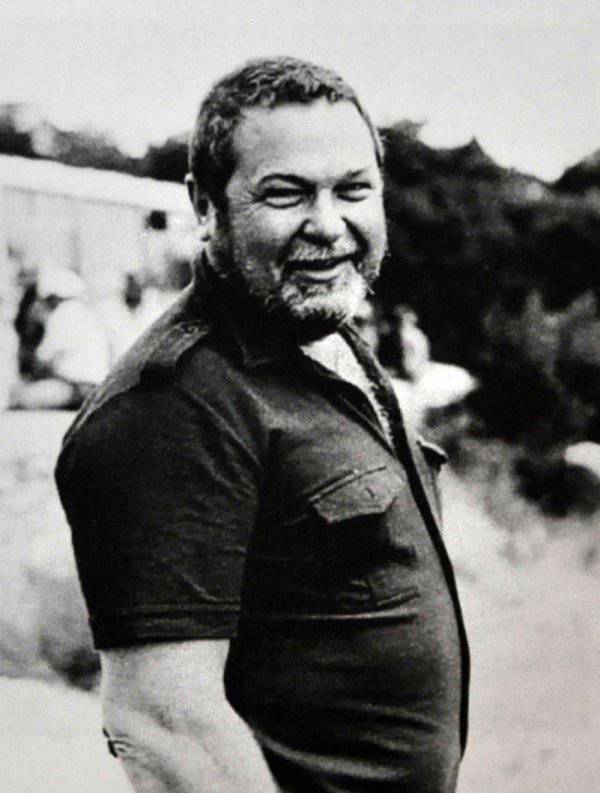
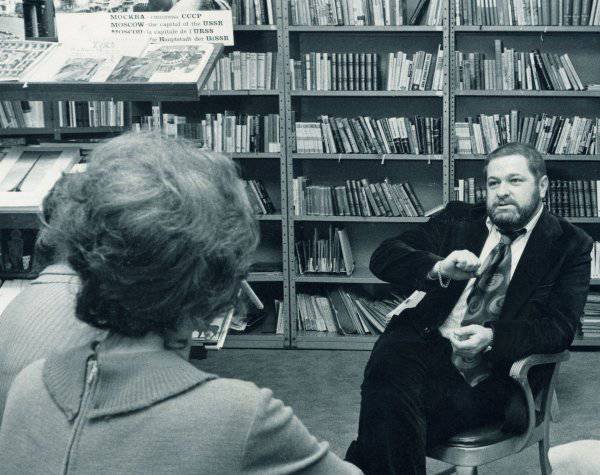
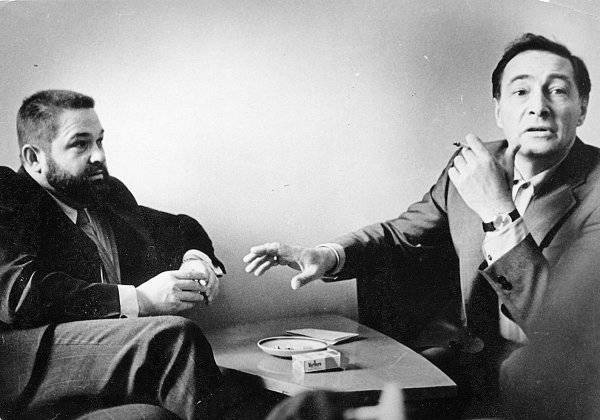
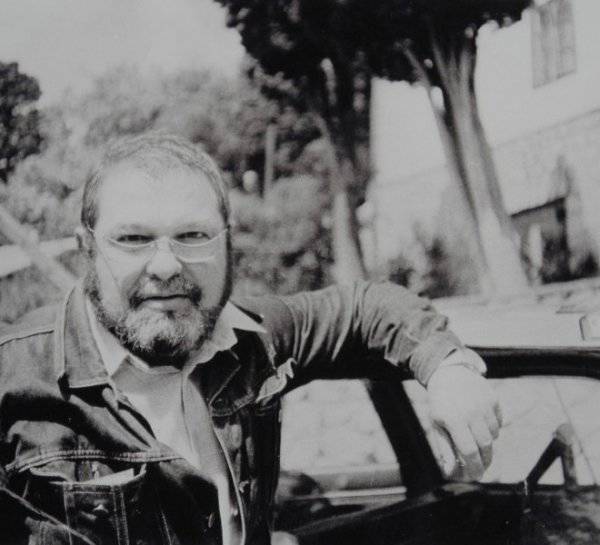
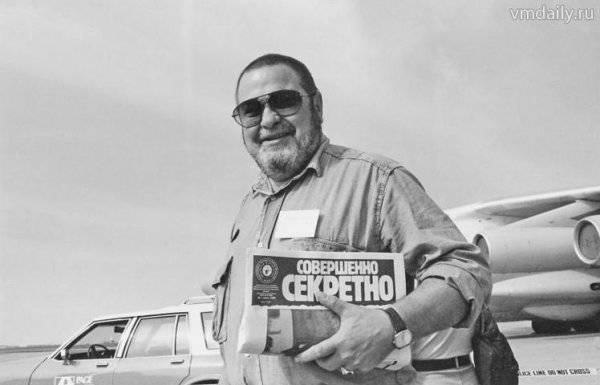
Information